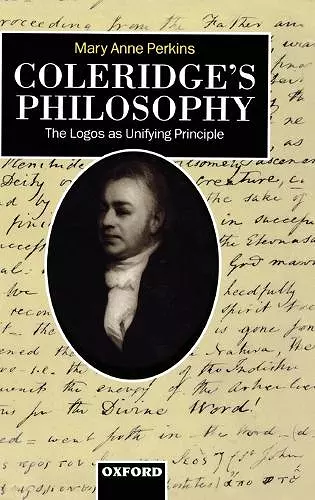Coleridge's Philosophy
The Logos as Unifying Principle
Format:Hardback
Publisher:Oxford University Press
Published:21st Jul '94
Currently unavailable, and unfortunately no date known when it will be back

Coleridge's status as a philosopher has often been questioned. `I am a poor poet in England,' he admitted, `but in America, I am a great philosopher.' J. S. Mill's assertion that `the time is yet far distant when, in the estimation of Coleridge, and of his influence upon the intellect of our time, anything like unanimity can be looked for' seems to have been justified. Mary Anne Perkins re-examines Coleridge's claim to have developed a `logosophic' system which attempted `to reduce all knowledges into harmony'. She pays particular attention to his later writings, some of which are still unpublished. She suggests that the accusations of plagiarism and of muddled, abstruse metaphysics which have been levelled at him may be challenged by a thorough reading of his work in which his unifying principle is revealed. She explores the various meanings for the term `Logos', a recurrent theme in every area of Coleridge's thought - philosophy, religion, natural science, history, political and social criticism, literary theory, and psychology. Coleridge was responding to the concerns of his own time, a revolutionary age in which increasing intellectual and moral fragmentation and confusion seemed to him to threaten both individuals and society. Drawing on the whole of Western intellectual history, he offered a ground for philosophy which was relational rather than mechanistic. He is one of those few thinkers whose work appears to become more interesting, his perceptions more acute, as the historical gulf widens. This book is a contribution to the reassessment that he deserves.
the most comprehensive and erudite study of Coleridge's ideas since Thomas McFarland's Coleridge and the Pantheist Tradition... impressive for the clarity with which it combines detailed analysis of Coleridge's often obscure pronouncements with a largely persuasive interpretation of his central concerns ... Her examination of the detail of his theories includes many valuable insights ... A further valuable element of Perkins's study is her analysis of Coleridge's later connection of the Christian Trinity with the 'trichotomy' which arises when a 'higher principle' is introduced as 'the source and unity of all thesis and antithesis relations'... The value of Perkins's insights into many of coleridge's more elusive theories should not be underestimated. * David Vallins, Book Reviews *
the meticulous, close work of someone who has had prolonged editorial exposure to primary texts and manuscript materials ... It is a major contribution to Coleridge studies .. fresh, unassuming, and astutue study of Coleridge's later poetry. * Timothy Morton, English Language Notes *
a comparative exposition, rather than a critique ... This itself is refreshing, given how much Coleridge has been criticized, and how little his intentions and achievements have been understood ... the most fruitful way of reading Coleridge ... a book of great lucidity, rarely suffering from a clumsy phrase or contorted sentence ... distils the essence of this philosophy ... a book to which we should constantly return, and those who cannot or will not master it, are excluding themselves from a realization of what Coleridge really thought. * The Coleridge Bulletin *
will ... spur vigorous research and review of Coleridge's status as a literary critic, psychologist, philosopher, and theologian... a great deal to commend Perkins's work ... she has certainly achieved her primary aim, "to give a new perspective on [Coleridge's] thought and show it to be of a more coherent nature than has generally been allowed." * The Charles Lamb Bulletin January 1996 *
A thorough and compelling presentation of Coleridge's ideas on the subject ... Perkins' achievement is to investigate thoroughly the network of ideas attaching to the concept of the Logos in Coleridge's mature writings. * Bulletin of the Hegel Society of Great Britain *
her clear and detailed presentation of ideas which Coleridge left scattered in notes and the margins of volumes borrowed from friends makes possible a more informed criticism by others ... No one should apply the label of Romantic ideologist to Coleridge before reading this book ... a book which all who want to know what the late Coleridge thought and why he thought it will find invaluable. * The Wordsworth Circle, Autumn '96 *
Almost miraculously, Mary Anne Perkins has written a genuinely original survey of his thought, drawing deeply on manuscript sources and eschewing tiresome references to modern commentators ... an elegant and intellectually relentless pursuit of that which holds together the vast enterprise of Coleridge's intellectual and spiritual life. ... This is one of the most important books about Coleridge to emerge in recent years. * Nineteenth-Century Literature, 50:4, March 1996 *
challenging, rigorous, and deeply informed study ... Perkin's credentials as a historian of ideas are undoubted, and her ability to range widely over Coleridge's own reading gives authority to her claims. The exclusiveness of its philosophical approach ensures the book's clarity, its momentum, and its own sense of conviction. There is undoubtedly an important place for the history of ideas when it is investigated with this degree of rigour, and Coleridge's Philosophy will go on being of major significance for a long time to come. * Lucy Newlyn, St Edmund Hall, Oxford, RES New Series, Vol. XLVIII, No. 190 (1997) *
ISBN: 9780198240754
Dimensions: 225mm x 143mm x 23mm
Weight: 500g
328 pages